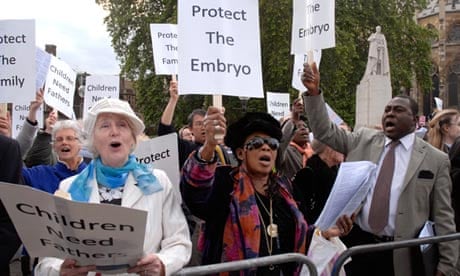Two Roman Catholic midwives have won the right to refuse to help with any abortion procedures or planning after an appeal court ruling in Scotland.
Judges in Edinburgh ruled that Mary Doogan, 58, and Concepta Wood, 52, who worked as labour ward co-ordinators in Glasgow, had a legal right to consciously object to helping with abortions in any way.
The ruling, which could be appealed against by Greater Glasgow and Clyde health board, may have wide ramifications for the NHS and other health staff who oppose abortions on religious grounds.
The midwives, practising Catholics, had lost a previous case against the board after a judge ruled that working on ward planning or delegating staff did not involve actually carrying out abortions.
Giving judgment in a judicial review last year, Lady Smith said: "Nothing they have to do as part of their duties terminates a woman's pregnancy.
"They are sufficiently removed from direct involvement as, it seems to me, to afford appropriate respect for and accommodation of their beliefs."
But the appeal court in Edinburgh on Wednesday overturned that ruling and said the Abortion Act 1967 gave medical staff wide-ranging protection against taking part in abortions on religious and conscience grounds.
Lady Dorrian, sitting with Lord Mackay of Drumadoon and Lord McEwan, said: "In our view the right of conscientious objection extends not only to the actual medical or surgical termination but to the whole process of treatment given for that purpose."
The midwives' lawyer, Gerry Moynihan QC, had said it was up to staff rather than their managers to decide what was morally or ethically objectionable to them. Their employers were saying that their administrative convenience over-rode the midwives' right to conscience, he argued.
Moynihan said the right to object covered all their duties, with the exception of helping in life-saving treatments. There was clear legal authority that the right to conscientious objection extended to all the staff involved in preparing or planning for a procedure, he said.
"The administrative convenience of the health board is irrelevant because the right is a balance between facilitating abortion while respecting the genuine conscientious objection of medical, nursing and ancillary staff," he told the court.
The health board said it was deciding its next step but would not comment further: "We note the outcome of the appeal and will be considering our options with our legal advisers over the next few days."
The most senior Catholic in Glasgow, Archbishop Philip Tartaglia, who is also president of the Bishops' Conference of Scotland, said the appeal ruling was "a victory for freedom of conscience and for common sense".
Commending the women on their courage, Tartaglia said he hoped other anti-abortion health workers would take their lead.
"As the judges state, the right of conscientious objection extends not only to the actual medical or surgical termination but to the whole abortion process," the archbishop said.
"I hope that many pro-life health professionals will take heart from this judgment and have the courage to express their own objections if and when they are asked to carry out tasks which are morally wrong and violate their conscience.
"Respect for workers' freedom of conscience is a hallmark of a civilised society."
Dr David Jones, director of the Catholic Anscombe Bioethics Centre, said the appeal court ruling could have widespread implications for the whole medical profession and could influence other disputes about the limits to religious conscience, including the right to wear a cross, if it was upheld.
He said it contradicted the General Medical Council's latest guidance for Britain's doctors, which came into force on Monday and said rights to conscientious objection were limited to "refusal to participate in the procedure itself".
"This pushes substantially the other way," Jones said. "Once we see if it is upheld on appeal or not appealed, we will see if it sets a precedent: this is a significant judgment which sends a signal which is much bigger than the case itself."
Responding to Jones's comments, Niall Dickson, the GMC's chief executive, said it would need to consider the implications of the judges' decision on its guidance. "We will study the outcome of this ruling, which has just come out, to see if there are any implications for our guidance. We already have clear guidance which says that doctors should be open with employers and colleagues so they can practise in accordance with their beliefs without compromising patient care," Dickson said.
Gillian Smith, director for Scotland of the Royal College of Midwives, said it wanted to see where this case finally ended before taking a view. "This is a very interesting decision, we will wait and see if there is a further judgment in relation to this complex case. The RCM position has always been and will remain that we support women's choice within the law," she said.
